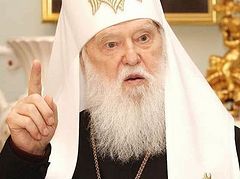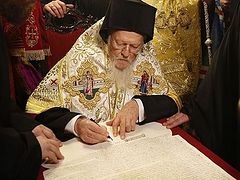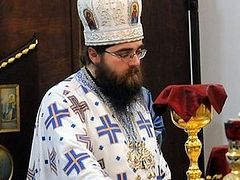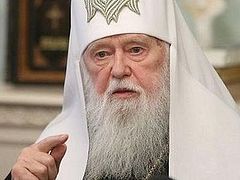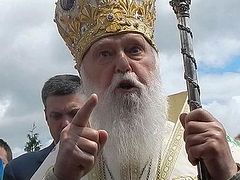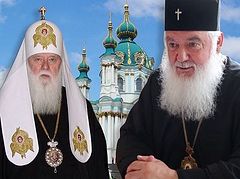Kiev, April 5, 2019
The statutes of the schismatic so-called “Orthodox Church of Ukraine” (OCU) written by the Holy Synod of Constantinople are harmful to the life of the OCU and even anti-canonical, “Metropolitan” Ioasaph of Belgorod and Oboyan writes in an open statement published on the site of the “Kiev Patriarchate” (KP), which continues to function despite the KP having joined the OCU on December 15.
According to Ioasaph, the hierarchs of the KP and the “Ukrainian Autocephalous Orthodox Church” (UAOC) did not even see the statutes prepared by Constantinople until the last minute. Thus, their discussions on the document were based on rumors and information on the internet.
Constantinople had to write the statutes because the hierarchs of the KPO and UAOC were unable to work together and write them themselves.
The schismatic bishops received the draft text only two hours before the vote on it. Ioasaph says that “Patriarch” Philaret Denisenko hadn’t even seen the document beforehand, although “Archbishop” Evstraty Zorya, the speaker for the KP, had seen it and discussed it with Constantinople.
One of the major stumbling blocks in the document was the stipulation that all foreign parishes of the KP and UAOC must go under Constantinople. Though “Metropolitan” Epiphany Dumenko, the primate of the new schismatic church, has said that discussions are underway to fulfill this obligation, others have stated that the foreign parishes have no desire to and will not go under Constantinople.
“Although the statutes have this requirement, in fact this requirement will not be fulfilled—the diaspora will remain in the church with full rights,” Ioasaph writes.
The composition of the Synod of the OCU has also caused controversy. The statutes stipulate that all bishops will be members on a rotating basis according to seniority of consecration, with the primate appointing them at the appropriate times. Thus, as Ioasaph writes, the primate can appoint those bishops who will accept whatever decisions he wants.
“By this, autocracy has been introduced into the church—the principle of conciliarity has been discarded,” the schismatic hierarch says. In his view, the statutes thus contradict the canons of the Church and are thus illegitimate. “Its provisions are not legal,” Ioasaph says.
He also laments that much of what was promised on the eve of the “unification council” has not been fulfilled—especially that Philaret Denisenko would maintain control over the new structure.
“They lied before the council about there being two primates… They lied about there being two primates commemorated at the services—Patriarch and Metropolitan. And where there is a lie, there is the father of lies. Where there is a lie, the grace of God is stopped,” Ioasaph writes.
He calls on the people of the OCU to fervently pray for Denisenko, remembering that it was his efforts that led to the creation of their church.
He even goes so far as to say there has been a revolution in their church, with the younger bishops rising up against Denisenko. He notes that while the first session of the Synod of the OCU appointed Denisenko to continue overseeing the parishes of Kiev, this came, in fact, only after Denisenko threatened to walk out and make a public statement after other bishops called for the Kiev Diocese to be taken away from him.
These younger bishops, he writes, had formed an alliance with the Greeks in order to eliminate Denisenko. Thus, Constantinople forbade him to put forward his own name in the elections for primate, which Ioasaph argues is, again, uncanonical. The KP bishops accepted this only because they believe the statutes would allow for Denisenko to maintain control, which, as aforementioned, was a lie.
Denisenko himself has also called for the statutes to be changed.
Follow us on Facebook!


